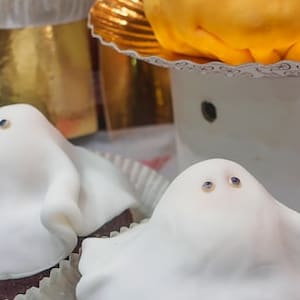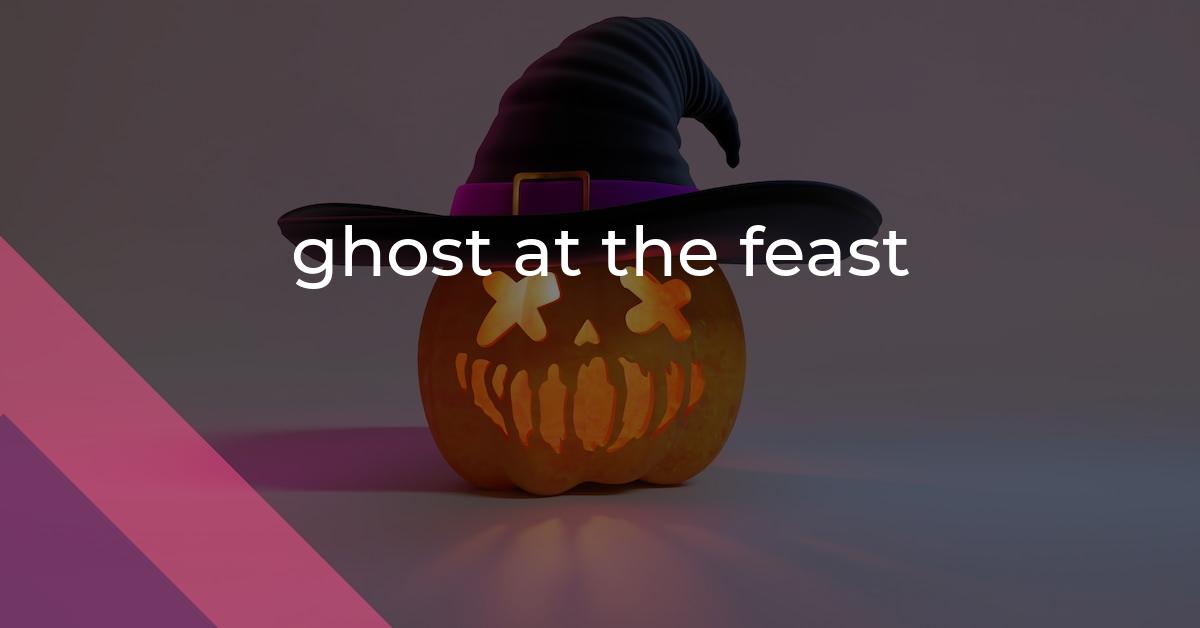ghost at the feast: Idiom Meaning and Origin
What does ‘ghost at the feast’ mean?
The idiom "ghost at the feast" describes a person who is unwelcome or unsettling in a particular situation or group gathering, usually because of their past actions or a sense of discomfort they bring. This individual's presence may disrupt the festivities or create a sense of unease among others.

Idiom Explorer
The idiom "horror show" is commonly used to describe a situation or event that is extremely unpleasant, horrifying, or disturbing.
The idiom "gooseberry eye" refers to a person feeling left out or excluded when in the company of a couple, often in a romantic setting.
The idiom "give someone the creeps" means to make someone feel extremely uncomfortable or scared, typically as a result of someone's behavior, appearance, or presence.
The idiom "ghost home" refers to a property or house that is believed to be haunted or inhabited by ghosts. It implies that the place is empty or abandoned by living beings.
An idiom used to describe someone or something from a person's past that unexpectedly reappears and has an impact on their present life or situation.
The idiom "get lost" means to tell someone to go away or leave, often used in a rude or dismissive manner. It is a way of expressing annoyance or frustration with someone's presence.
The idiom "fox in the henhouse" refers to a person or thing that poses a threat or danger by infiltrating a group or situation where they are not welcome or trusted.
The idiom "fly on the wall" refers to being in a situation where one can observe or overhear others without them being aware of it.
The idiom "fish out of water" refers to a person who feels uncomfortable or out of place in a particular situation or environment.
The idiom “fifth wheel” refers to a person or thing that is unnecessary or unwanted in a particular situation, making others feel uncomfortable or out of place.
Uninvited Specter
The idiom "ghost at the feast" holds various meanings and connotations in different contexts. It is primarily used to describe someone who disrupts or spoils a happy or celebratory occasion. It also symbolizes a sense of melancholy or unease amidst joyful gatherings. The origins and etymology of this idiom, however, remain obscure, with no concrete evidence to pinpoint its exact creation or evolution.
The phrase "ghost at the feast" implies a presence that unsettles or disturbs the otherwise joyous atmosphere of a celebration or gathering. It suggests a figurative specter, a haunting presence that brings an element of discomfort or sadness to an otherwise happy occasion. It can denote an individual who is out of place or unwelcome, perhaps due to their negative demeanor or outcast status.
One possible interpretation of this idiom could stem from the association of ghosts with death and the macabre. Festivals and feasts are typically occasions of merriment and revelry, where people come together to celebrate life, love, and happiness. Therefore, the presence of a ghost at such an event could symbolize an intrusion of the solemn or mournful into a realm of joy and celebration.
Although the precise origins of this idiom are unknown, it possibly emerged from a long-standing tradition of using supernatural beings to represent unsettling or disruptive elements within cultural narratives. Ghosts have often been depicted as agents of chaos or harbingers of misfortune in folklore and literature across societies.
In a broader context, the idiom "ghost at the feast" can be seen as a universal expression that transcends cultural boundaries. Its usage is not necessarily limited to any particular group or region, making it a versatile idiom that can be applied to a wide array of situations. It can describe someone who consistently brings negativity, sadness, or discomfort to otherwise pleasant circumstances.
The related idiom "ghost home" refers to someone who feels uncomfortable or out of place in their own dwelling. They may sense a strange presence or feel as if they are living in a haunted house. This idiom captures the feeling of being a "ghost" in one's own home, experiencing unease or a sense of being unwelcome.
Similarly, the idiom "ghost from one's past" refers to a person or event that continues to have an impact on someone's present life, despite being long gone. It could be a past relationship, a traumatic event, or a regretful decision. This idiom conveys the idea that the past can sometimes haunt or overshadow the present, much like a ghost at a feast.
The idiom "fish out of water" is another phrase related to the concept of feeling out of place. It describes a person who is in an unfamiliar or uncomfortable environment. This idiom implies a sense of unease and the inability to adapt or fit in, much like the feeling caused by a ghost at a celebration.
Despite its wide usage, the idiom "ghost at the feast" lacks a definitive genesis or historical reference that can shed light on its exact origins. The phrase has likely evolved over time through its frequent use in various contexts. Its continued relevance in modern language attests to the enduring power of idioms to encapsulate complex emotions or concepts in a succinct manner.
Ultimately, the idiom "ghost at the feast" remains a captivating linguistic expression that invites contemplation and exploration. While its etymology remains shrouded in uncertainty, its evocative imagery and connection to the human experience ensure its enduring presence within our lexicon. As language continues to develop and evolve, it is possible that new interpretations and understandings of this idiom will arise, perpetuating the rich tapestry of human expression.
Example usage
"Even though Jane was the guest of honor at the party, she felt like a ghost at the feast because no one paid attention to her."
"John's siblings always overshadow him with their achievements, making him feel like a ghost at the feast during family gatherings."
"Despite being part of the team, Sarah's contributions are often overlooked, leaving her feeling like a ghost at the feast."
More "Metaphorical" idioms



